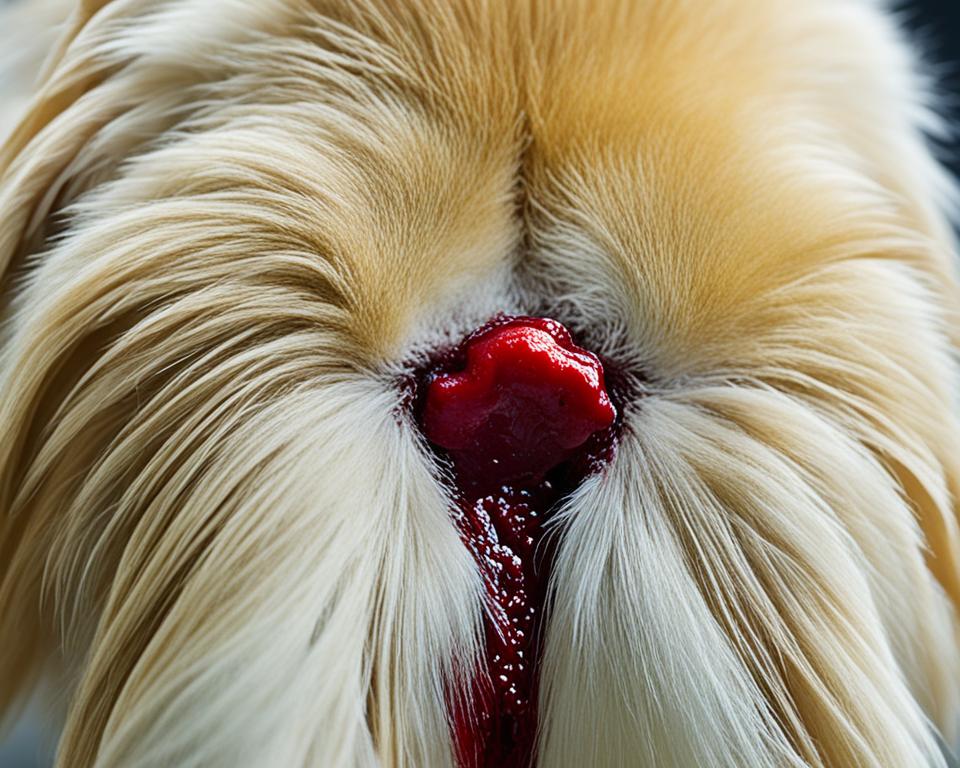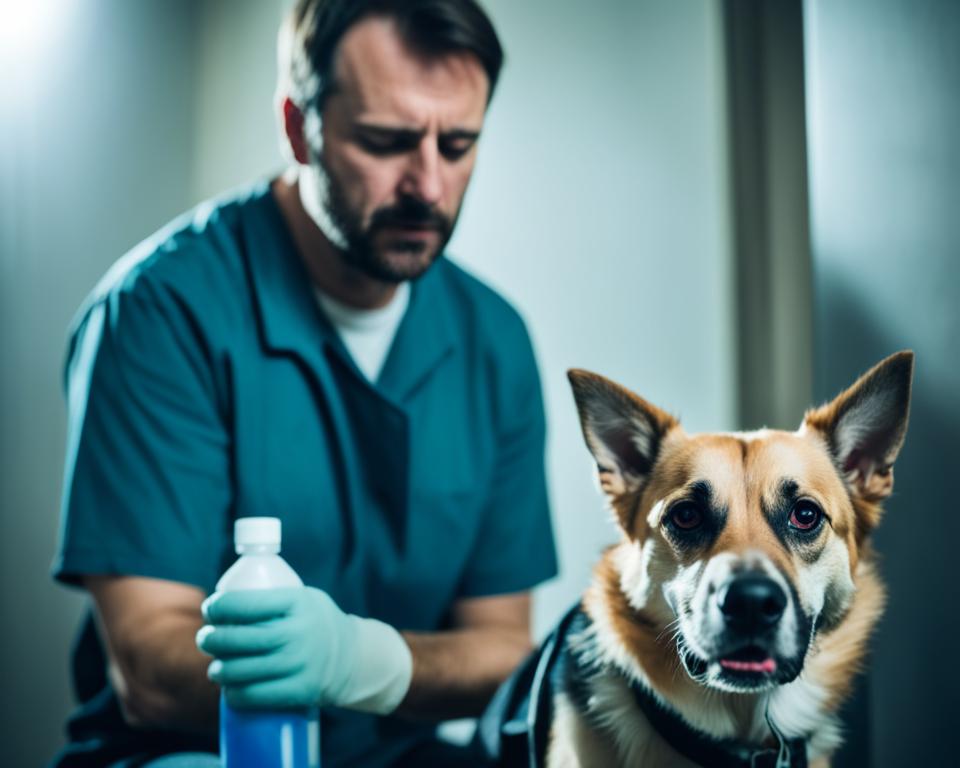Why Is My Dog Pooping Blood? Causes and What to Do
Discover reasons for bloody stools in dogs and learn immediate actions to take. Find vital info on when to seek emergency care for your pet.

Did you know that approximately 10% of dogs experience blood in their stool at some point in their lives? Seeing blood in your dog’s stool can be a distressing sight, but it’s crucial to understand the underlying causes and take appropriate action. In this article, we will delve into the reasons why dogs may poop blood and provide guidance on what to do in such situations. By gaining insights into these causes, you can provide the necessary care for your furry friend and seek veterinary attention when needed.
When it comes to our beloved pets, their health is of utmost importance. Understanding why your dog is pooping blood can provide valuable information for both prevention and treatment. Taking the right steps can make a significant difference in your dog’s well-being, whether it’s a minor issue or a potential indicator of a more serious condition.
Identifying Blood in Your Dog’s Stool

When examining your dog’s stool, it’s essential to distinguish true blood from other red substances that may cause discoloration. This can help you understand the possible causes of blood in your dog’s stool and determine the appropriate course of action. Here are some tips on how to identify blood in your dog’s stool:
It’s important to differentiate true blood from other substances that may appear red in your dog’s stool. Certain foods or treats, such as beets or artificial food dyes, can cause temporary discoloration. To identify true blood, look for the following characteristics:
- Bright red color: True blood in your dog’s stool typically appears bright red. It may be fresh and vibrant in color.
- Consistency: Blood in your dog’s stool may appear mixed in with the feces or streaked on the surface. It may also be present in the form of blood clots.
- Quantity: The amount of blood in your dog’s stool can vary. It may range from small traces to more significant amounts.
Understanding the Causes of Blood in Dog’s Stool
Blood in a dog’s stool can be a concerning sign that indicates underlying health issues. By recognizing the indicators and understanding the causes, you can take the necessary steps to address the problem and ensure the well-being of your furry friend.
Hematochezia: Indicators of Lower Digestive Tract Issues
Hematochezia refers to the presence of fresh, bright red blood in your dog’s stool, which typically suggests bleeding in the lower digestive tract. This can be linked to various conditions, including:
- Parvovirus: A highly contagious viral infection that affects the gastrointestinal system
- Hemorrhagic gastroenteritis: Inflammation of the intestines causing bloody diarrhea
- Cancer: Tumors in the lower digestive tract can lead to bleeding
- Infections: Bacterial or parasitic infections can cause intestinal bleeding
- Digestive issues: Conditions like inflammatory bowel disease or dietary indiscretion can result in blood in the stool
It’s crucial to consult your veterinarian if you notice hematochezia in your dog’s stool to determine the underlying cause and initiate appropriate treatment.
Melena: Recognizing Upper Digestive Tract Problems
Melena refers to the presence of dark, tarry, and foul-smelling blood in your dog’s stool, indicating bleeding in the upper digestive tract. This can be caused by various factors, such as:
- Ulcers: Open sores in the stomach or intestines that can lead to bleeding
- Infections: Certain bacterial or viral infections can cause bleeding in the upper digestive tract
- Tumors: Abnormal growths in the upper gastrointestinal system can result in melena
- Ingestion of blood: Your dog may consume blood from an external source, leading to its appearance in the stool
When is Blood in Dog Stool an Emergency?

When you notice blood in your dog’s stool, it’s important to understand the urgency of the situation. While some cases may not require immediate veterinary care, others can be emergencies that demand prompt attention. In this section, we’ll discuss the importance of seeking veterinary care without delay and provide guidance on assessing your dog’s overall health and behavior.
The Importance of Prompt Veterinary Care
In emergency situations with blood in your dog’s stool, prompt veterinary care is crucial for several reasons. First and foremost, it ensures that your dog receives the necessary medical attention to address the underlying cause of the bloody stool. This is particularly important because blood in the stool can be an indication of serious health issues that require immediate treatment. By seeking veterinary care promptly, you can help prevent further complications and ensure the well-being of your pet.
Additionally, prompt veterinary care can provide you with peace of mind as a pet owner. It allows you to consult with a professional who can offer expert advice and guidance tailored to your dog’s specific condition. This can alleviate any feelings of uncertainty or anxiety that you may experience when faced with the presence of blood in your dog’s stool.
Assessing Your Dog’s Overall Health and Behavior
When determining the urgency of blood in your dog’s stool, it’s essential to assess your dog’s overall health and behavior. Pay attention to any accompanying symptoms or changes in behavior that may indicate a more serious condition. These can include lethargy, loss of appetite, vomiting, diarrhea, abdominal pain, or difficulty defecating.
Furthermore, observe your dog’s behavior and demeanor. Note any signs of distress, discomfort, or abnormal behavior that may suggest the need for immediate veterinary attention. This can include excessive panting, restlessness, pacing, continuous whining, or attempts to lick or bite the affected area.
By carefully evaluating your dog’s health and behavior, you can gain insights into the urgency of the situation and make an informed decision regarding the need for veterinary care. Remember, your veterinarian is the best resource to determine the appropriate course of action and provide the necessary medical assistance to address the bloody stool.

Why Is My Dog Pooping Blood?
Understanding the reasons behind dogs pooping blood is crucial for proper diagnosis and treatment. There are several factors that can contribute to this symptom:
- Infections: Bacterial or viral infections can cause inflammation and bleeding in the digestive system.
- Gastrointestinal disorders: Conditions such as inflammatory bowel disease or intestinal parasites can lead to bloody stool.
- Dietary changes: Abrupt changes in diet or the ingestion of certain foods can irritate the digestive system and result in blood in the stool.
- Stress-induced bloody stool: Dogs can experience stress or anxiety that affects their digestive health, leading to bloody stool.
- Other underlying health issues: Conditions like tumors, ulcers, or anal gland problems can also cause dogs to pass blood in their stool.
Common Conditions Associated with Bloody Diarrhea in Dogs
Bloody diarrhea in dogs can be caused by a variety of conditions. Understanding these common conditions is essential for identifying the underlying cause and seeking appropriate treatment. In this section, we will explore both infectious and non-infectious causes of bloody stool in dogs.
Infectious Diseases: Parvovirus and Similar Ailments

Infectious diseases, such as parvovirus, can lead to bloody diarrhea in dogs. Parvovirus is a highly contagious viral infection that affects the gastrointestinal tract. It commonly affects puppies and older dogs with weakened immune systems. Other infectious ailments that can cause bloody stool include bacterial or viral gastrointestinal infections.
If your dog exhibits symptoms such as severe diarrhea, vomiting, lethargy, loss of appetite, and dehydration, it is crucial to seek immediate veterinary care. These infectious diseases require prompt diagnosis and treatment to prevent further complications and ensure a better prognosis.
Non-Infectious Causes: Stress-Induced Bloody Stool
Stress-induced bloody stool is a non-infectious cause that can affect dogs. Like humans, dogs can experience stress, which can manifest in various ways, including gastrointestinal issues. Common stressors for dogs include changes in routine, environmental changes, separation anxiety, and loud noises.
When dogs are stressed, it can lead to gastrointestinal disturbances, such as bloody diarrhea. Managing stress through various techniques, including environmental enrichment, behavior modification, and possible medical interventions, can help prevent or alleviate stress-induced bloody stool.
| Common Conditions with Bloody Diarrhea in Dogs | Causes |
|---|---|
| Infectious Diseases | Parvovirus and similar viral or bacterial infections |
| Stress-Induced Bloody Stool | Anxiety and stress-related gastrointestinal disturbances |
| Gastrointestinal Disorders | Inflammatory bowel disease, gastritis, or ulcers |
| Dietary Factors | Food intolerance or dietary changes |
In addition to infectious diseases and stress-induced bloody stool, there are other potential non-infectious causes for dogs pooping blood, including gastrointestinal disorders and dietary factors. These conditions can contribute to bloody diarrhea and may require specific treatments or dietary adjustments.
Treatments for Bloody Stool in Dogs
Addressing bloody stool in dogs requires appropriate treatment methods based on the underlying cause. There are various medicinal interventions and surgical procedures available to alleviate the symptoms and treat the root causes of bloody stool in dogs.
Medicinal Interventions for Intestinal Soothing
Medicinal interventions are often used to soothe the intestines and resolve gastrointestinal issues that may be causing bloody stool in dogs. These interventions can include:
- Anti-inflammatory medications
- Antibiotics to treat infections
- Medications to alleviate diarrhea or constipation
- Probiotic supplements to restore the balance of gut bacteria
These medicinal interventions aim to reduce inflammation, fight infections, improve digestion, and restore the overall health of the digestive system.
Surgical Procedures for Underlying Causes
In some cases, surgical procedures may be necessary to treat the underlying causes of bloody stool in dogs. These procedures can be performed to address conditions such as:
- Tumors or polyps in the digestive tract
- Intestinal obstructions
- Ulcers or lesions
- Abnormalities in the gastrointestinal anatomy
The specific surgical procedure will depend on the diagnosed condition and the individual needs of the dog. Surgery aims to remove or repair the underlying cause of the bloody stool, providing long-term relief and improving the dog’s overall health.
It is important to consult with a veterinarian to determine the most appropriate treatment option for your dog based on their specific condition and medical history.
| Treatment Options | Description |
|---|---|
| Medicinal Interventions | Includes anti-inflammatory medications, antibiotics, medications to alleviate diarrhea or constipation, and probiotic supplements to restore gut health. |
| Surgical Procedures | May involve removing tumors or polyps, addressing intestinal obstructions, treating ulcers or lesions, or correcting gastrointestinal abnormalities. |
When to Seek Professional Veterinary Advice?
Recognizing signs and symptoms that warrant veterinary attention is crucial for the well-being of your dog. If you notice any changes in your dog’s behavior, it’s important to seek professional care. Professional veterinary care is especially necessary if you observe severe bleeding or if the bleeding persists over time.
Professional veterinary advice should be sought when you notice any of the following symptoms. Changes in behavior, such as lethargy, loss of appetite, or excessive thirst, can indicate underlying health issues that require prompt attention. Similarly, if you notice severe bleeding in your dog’s stool or if the bleeding persists for more than 24 to 48 hours, it is essential to consult a veterinarian immediately.
FAQs on why is my dog pooping blood
Is bloody diarrhea in dogs an emergency?
In some cases, bloody diarrhea in dogs can be a sign of a serious condition and may require immediate veterinary care. It is best to consult with a veterinarian to assess the urgency of the situation.
Why is my dog pooping bloody diarrhea but acting normal?
Dogs may appear normal despite pooping bloody diarrhea due to their ability to mask pain or discomfort. However, it is still important to have your dog evaluated by a veterinarian to determine the underlying cause of the bloody stool.
What can I give my dog for bloody diarrhea?
It is not advisable to treat bloody diarrhea in dogs at home without veterinary guidance. The appropriate treatment will depend on the underlying cause, and a veterinarian can recommend the appropriate medication or therapy.
Can you treat bloody diarrhea at home?
It is not recommended to treat bloody diarrhea in dogs at home without veterinary guidance. The underlying cause needs to be identified, and appropriate treatment can be determined by a veterinarian.
What dog food is good for bloody stool?
Dietary adjustments and prescription diets can help manage bloody stool in dogs. Your veterinarian can recommend specific dog foods or ingredients that may be beneficial for your dog’s sensitive digestive system.
How to identify blood in my dog’s stool?
To identify blood in your dog’s stool, look for bright red or dark, tarry stool. It is important to distinguish true blood from other red substances, such as food dyes or ingested materials. If you suspect blood in your dog’s stool, consult a veterinarian for a proper diagnosis.
When is blood in a dog’s stool an emergency?
Blood in a dog’s stool may be considered an emergency if it is accompanied by severe bleeding, persistent symptoms, or concerning changes in your dog’s behavior. It is important to seek prompt veterinary care in such cases to ensure the well-being of your pet.
How is bloody stool in dogs treated?
Treatment for bloody stool in dogs depends on the underlying cause. It may involve medicinal interventions to soothe the intestines and resolve gastrointestinal issues, or surgical procedures for underlying causes such as tumors, obstructions, or ulcers. Consult with a veterinarian for appropriate treatment options.
How can I prevent future episodes of bloody diarrhea in my dog?
Preventive measures to reduce the risk of recurring bloody diarrhea in dogs may include dietary adjustments, such as feeding a prescription diet tailored for dogs with sensitive digestive systems. Additionally, supplements may help restore and maintain intestinal health. Consult with a veterinarian for specific recommendations.
When should I seek professional veterinary advice for bloody stool in my dog?
It is recommended to seek professional veterinary advice if your dog has persistent bloody stool, severe bleeding, or concerning symptoms. A veterinarian can provide proper care, diagnosis, and treatment for your dog’s condition.





